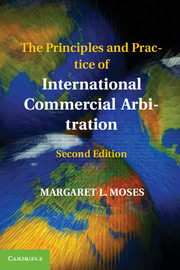Book contents
- Frontmatter
- Contents
- Preface to the Second Edition
- Foreword to the First Edition
- Chapter One Introduction to International Commercial Arbitration
- Chapter Two The Arbitration Agreement
- Chapter Three Drafting the Arbitration Agreement
- Chapter Four Applicable Laws and Rules
- Chapter Five Judicial Assistance for Arbitration
- Chapter Six The Tribunal
- Chapter Seven The Arbitral Proceedings
- Chapter Eight The Award
- Chapter Nine Attempts to Set Aside an Award
- Chapter Ten Enforcement of the Award
- Chapter Eleven Investment Arbitration
- Appendix A The United Nations Convention on the Recognition and Enforcement of Foreign Arbitral Awards (The New York Convention) (1958)
- Appendix B UNCITRAL Model Law on International Commercial Arbitration (original 1985 version)
- Appendix C Revised Articles of the UNCITRAL Model Law on International Commercial Arbitration (2006)
- Appendix D UNCITRAL Recommendation Regarding the Interpretation of Article II, Paragraph 2, and Article VII, Paragraph 1, of the New York Convention
- Appendix E IBA Rules on the Taking of Evidence in International Arbitration
- Appendix F IBA Rules of Ethics for International Arbitrators 1987
- Appendix G IBA Guidelines on Conflicts of Interest in International Arbitration
- Appendix H The AAA–ABA Code of Ethics for Arbitrators in Commercial Disputes
- Appendix I Model Clauses
- Appendix J Useful Arbitration Websites
- Index
- References
Chapter Ten - Enforcement of the Award
Published online by Cambridge University Press: 05 June 2012
- Frontmatter
- Contents
- Preface to the Second Edition
- Foreword to the First Edition
- Chapter One Introduction to International Commercial Arbitration
- Chapter Two The Arbitration Agreement
- Chapter Three Drafting the Arbitration Agreement
- Chapter Four Applicable Laws and Rules
- Chapter Five Judicial Assistance for Arbitration
- Chapter Six The Tribunal
- Chapter Seven The Arbitral Proceedings
- Chapter Eight The Award
- Chapter Nine Attempts to Set Aside an Award
- Chapter Ten Enforcement of the Award
- Chapter Eleven Investment Arbitration
- Appendix A The United Nations Convention on the Recognition and Enforcement of Foreign Arbitral Awards (The New York Convention) (1958)
- Appendix B UNCITRAL Model Law on International Commercial Arbitration (original 1985 version)
- Appendix C Revised Articles of the UNCITRAL Model Law on International Commercial Arbitration (2006)
- Appendix D UNCITRAL Recommendation Regarding the Interpretation of Article II, Paragraph 2, and Article VII, Paragraph 1, of the New York Convention
- Appendix E IBA Rules on the Taking of Evidence in International Arbitration
- Appendix F IBA Rules of Ethics for International Arbitrators 1987
- Appendix G IBA Guidelines on Conflicts of Interest in International Arbitration
- Appendix H The AAA–ABA Code of Ethics for Arbitrators in Commercial Disputes
- Appendix I Model Clauses
- Appendix J Useful Arbitration Websites
- Index
- References
Summary
In many instances, a losing party will voluntarily comply with an arbitration award, so enforcement proceedings will not be necessary. If, on the other hand, the prevailing party is required to initiate judicial enforcement because of the recalcitrance of the losing party, the good news is that the award is likely to be enforced. One of the prime reasons parties include an arbitration clause in an international contract is the relatively certain enforceability of the award. The likelihood of enforcement is high because so many countries have adopted international conventions that are pro-enforcement – that is, they provide only narrow grounds for refusing to enforce. This chapter discusses some of the issues and procedures pertinent to recognition and enforcement of awards under international conventions and various national laws, as well as the limited grounds for refusing enforcement.
APPLICATION OF INTERNATIONAL CONVENTIONS
The Convention on Recognition and Enforcement of Foreign Arbitral Awards, also known as the New York Convention, requires courts of Contracting States to enforce both arbitration agreements and arbitration awards. Currently, more than 145 countries are parties to the New York Convention. The New York Convention has contributed to the growth of international arbitration because parties in Contracting States are confident that if they prevail in an arbitration, they will obtain a remedy. A 2005 study noted that for corporate counsel, the most important reason for choosing arbitration over litigation to settle disputes was the enforceability of awards. Because the New York Convention is the predominant arbitration enforcement convention, this chapter focuses primarily on its function, requirements, and effect.
- Type
- Chapter
- Information
- Publisher: Cambridge University PressPrint publication year: 2012



